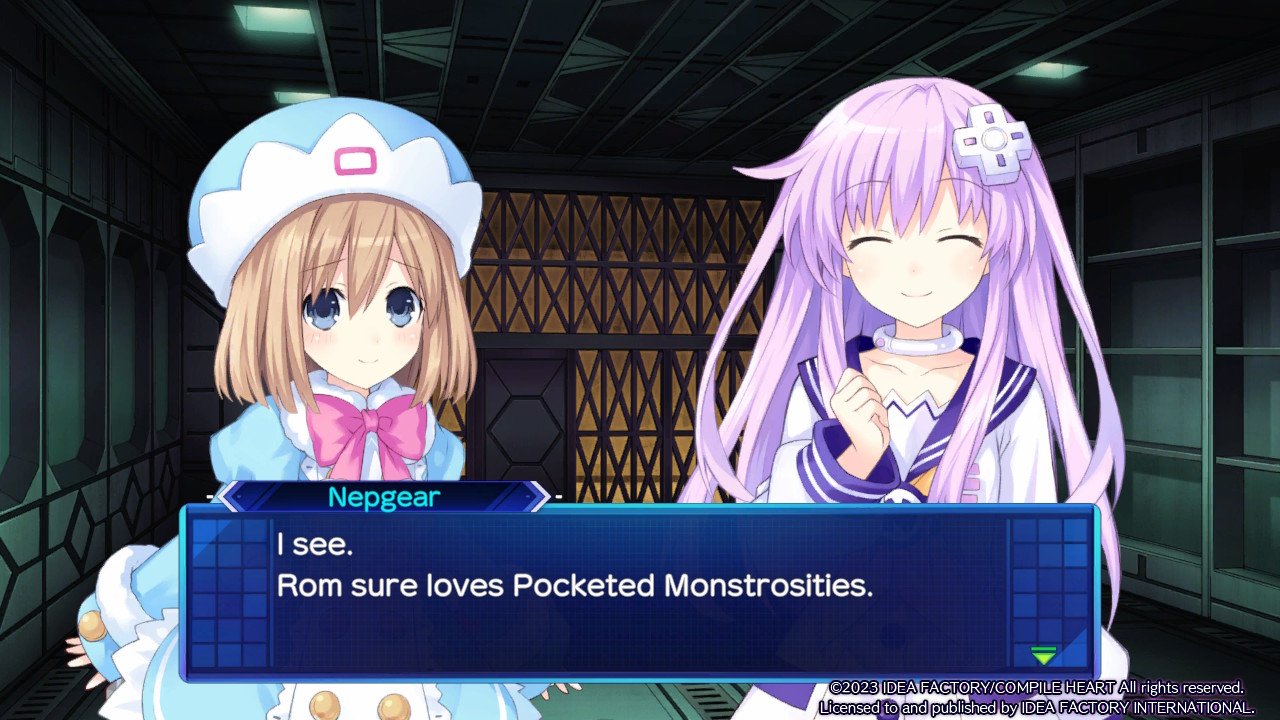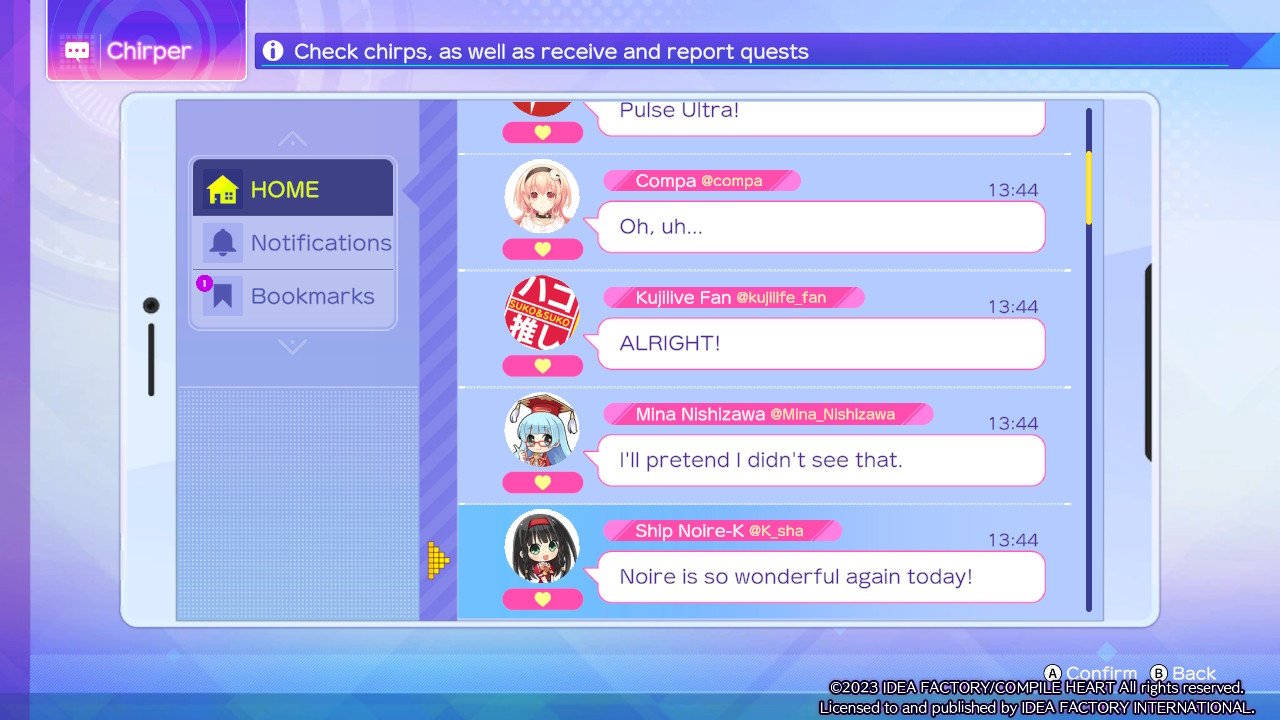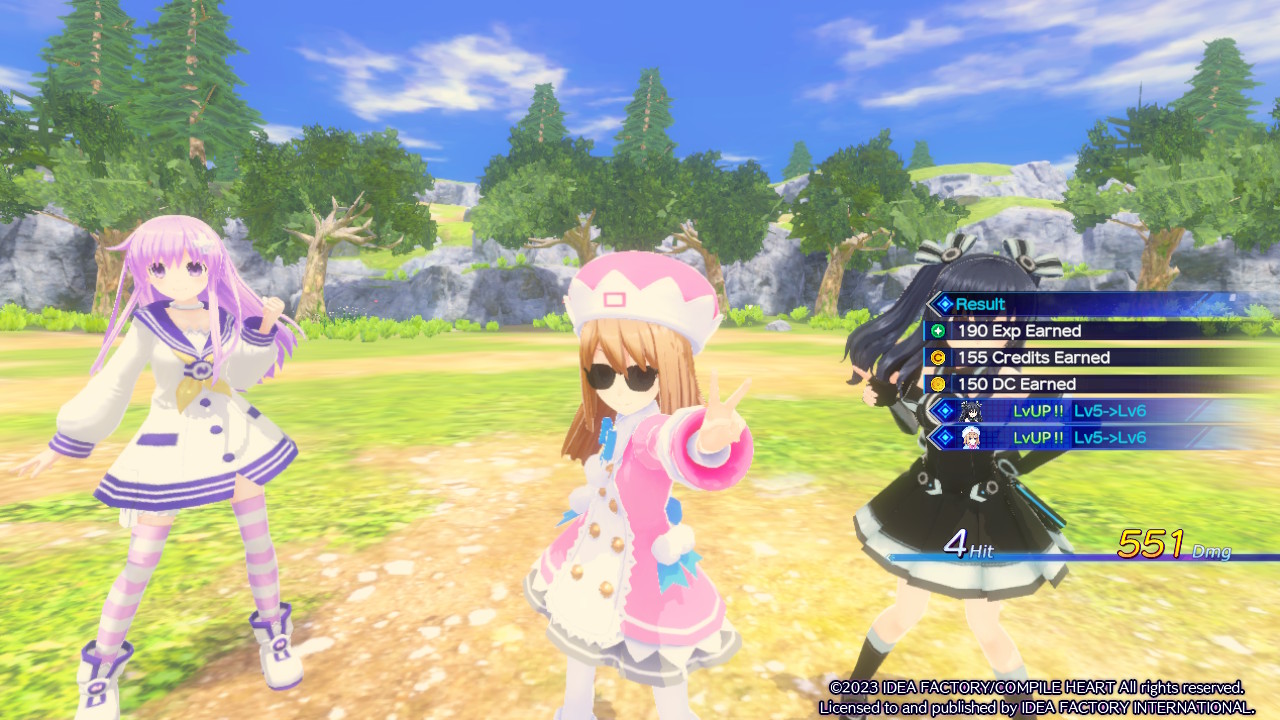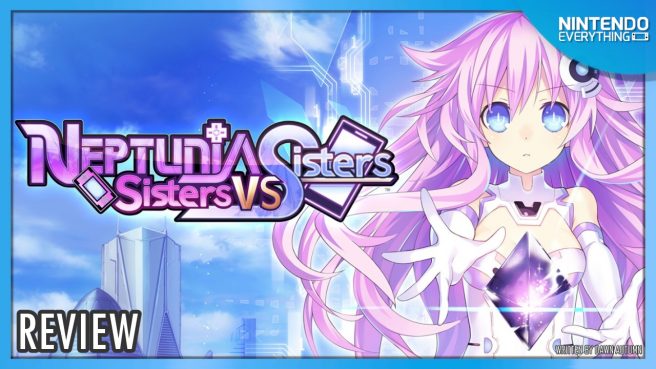System: Switch
Release date: January 23, 2024
Developer: Idea Factory / Compile Heart
Publisher: Idea Factory
Hyperdimension Neptunia is a series that has been around for a long time now, and much like the video game industry that it shamelessly parodies, it is constantly changing, incorporating new ideas and gameplay mechanics into its premise to stay relevant. This has not always been for the better, however. Neptunia: Sisters VS Sisters, the latest entry in the franchise to make its way to the Switch, now features some of the series’ best writing to date, but is let down quite significantly in other areas, making it a tough sell for any but those already invested in the series.
Sisters VS Sisters takes place in the world of Gamindustri, a world composed of landmasses ruled over by Goddesses that are inspired by the console developers of our own world. Despite the expected friction between the various nations the world is a mostly peaceful one, with the four Goddesses and their allies able to present a united front against the forces that threaten them. In this installment, after waking from a forced two-year long sleep, their younger sisters, the Goddess Candidates, find that Gamindustri is not the place that they remember it to be. The land is now being threatened by the Trendi Phenomenon, which results in fierce monsters attacking and preventing citizens from leaving their homes. People have turned their attention towards the rPhone, a new device that is their only means of communication in these dangerous times, and faith in the Goddesses has declined as a result, dramatically weakening them and preventing them from countering the threat. It is up to Nepgear and her fellow candidates to discover the mystery behind these circumstances and restore the land to its natural order.
For those unfamiliar with the franchise there is quite a lot to take in during the game’s opening hours, and the narrative of Sisters VS Sisters doesn’t really pick up until several hours into the game, taking the time to go through what will feel like several unconnected events before things begin to come together. But despite this slow, sometimes confusing start, I found the writing in the game to be its greatest strength: with the steady rise of mobile gaming pushing traditional console gaming into what many perceive to be irrelevancy, and in the aftermath of a global pandemic, Sisters VS Sisters presents a setting that is immediately relatable, and despite the game being initially released in the west over a year ago a lot of the story beats and concepts explored here are still highly relevant.
This makes the satire and parodies of more contentious topics such as the use (or misuse) of AI and phone and social media addiction feel particularly potent, with the comedic aspect preventing it from becoming a more edgy or preachy social commentary. The Neptunia series has always juxtaposed a more traditional high-stakes RPG narrative with light-hearted slice-of-life silliness, and Sisters VS Sisters is no exception to this, balancing the two perfectly to deliver a unique storytelling experience that somehow manages to treat the more serious topics with the sensitivity they deserve whilst simultaneously giving them a ridiculous spin that will inevitably put a smile on your face; I found myself chuckling on more than one occasion at the references that I picked up on during my playthrough.

Your mileage with the game’s story and cast as a whole will vary heavily depending upon your knowledge of anime and video game culture, as these are the building blocks of Gamindustri and all of the major characters that inhabit it (outside of the Goddesses and their sisters representing console developers such as Nintendo and Sony, you also have characters representing series such as Higurashi, or companies such as Compile Heart) but even if you fail to notice the more subtle or obscure references, it’s unlikely that you’ll fail to spot the more blatant ones of more popular series, which the characters will just casually drop in the middle of conversation without missing a beat. Although there is little in the way of character growth and development over the course of the story, each character has an already well-defined personality that makes their interactions with one another feel distinct, and for existing fans of the Neptunia series there are numerous references to prior games that make Sisters VS Sisters feel more like a sequel to earlier titles such as Megadimension Neptunia VII, as opposed to the more standalone nature of spinoffs like Neptunia x Senran Kagura: Ninja Wars. It’s an excellent jumping on point for newcomers, and a strong continuation if you’ve played any of the prior titles.
The majority of the game’s dialogue is accompanied by delightfully animated and highly expressive character portraits, and although a lot of it outside of the main story is sadly unvoiced, both English and Japanese language options are available. The Neptunia series dub is one of my personal favorites, so this was an inclusion I was glad to see make its way back into this game, having been absent from the series since 2018’s Super Neptunia RPG. More voice acting would have been welcome, however, and it’s disappointing that it is used so sparingly: although it has a lot of more interactive gameplay for the player to get involved with, Sisters VS Sisters most often presents itself as a kinetic visual novel, and you’ll be spending more time reading than you will playing if you choose to engage with its side content and many optional cutscenes – something that you will probably want to do if you’re choosing to pick this up, as this is where the game is at its best and takes full advantage of its unique setting.
When you’re not watching the interplay between the cast in these visual novel segments, you’ll be exploring the various areas of Gamindustri, which will gradually open up to you as you progress the story. This is unfortunately not quite as exciting, and if you’ve ever played a Neptunia title before you’ll be seeing a lot of re-used map assets and enemy designs from previous entries, accompanied by the same familiar music. It has become a series staple at this point, but even if this is your first game these elements add a monotony to proceedings that makes exploration feel more like a tedious break between the more interesting story cutscenes rather than a break from them, which I found to be particularly grating at times given the nature of the game’s combat. Maps are either large empty spaces or a series of twisting narrow corridors, with little variety in the scenery or the enemies you’ll encounter, with a handful of treasures, warp points, and switches to open gates to spice things up. The path you’ll travel is usually a linear one, and it never feels quite as though it reaches its full potential, as the possibilities to parody famous locations from franchises are endless and, sadly, completely unexplored.

Of course you’ll also encounter enemies on the map, and combat in Sisters VS Sisters plays out in real-time. You’ll enter battle with three party members and assault your enemy with a chain of combo attacks, with each move costing AP that recharges during battle, but not in time for you to control a single character indefinitely if you wish to keep up your attacks. You can also execute special moves but, as you might expect, your ability to do this is limited further by their increased power. However, you can freely switch between your party members at any time using the shoulder buttons, and the general idea is to do this as much as possible to keep your combo going and prevent any one character from being idle, with the other two being controlled by a fairly competent AI in your absence. Swapping in at the right time will see your new character automatically execute an attack to continue the combo, at which point you can continue to hammer away at the end with that character, combo chain intact, until the time comes to switch again.
Once you get accustomed to the general rhythm of combat and learn when to switch between your party members it can be quite satisfying, but I found that the novelty of this quickly wore off when every single encounter played out in exactly the same way: with my characters stunlocking enemies and even bosses with an endless string of combo attacks. Sisters VS Sisters lacks any kind of challenge or balance, and although initially your choice of combo attacks will be quite limited, you’ll gain levels and new moves at a brisk pace even if you avoid most optional enemy encounters, making it very easy to inadvertently powerlevel your way right past enemies in the area you’re exploring. The lack of need to grind is definitely a point in this game’s favor, but unfortunately it does not make the combat any more enjoyable.
It’s worth noting that the game’s performance takes a painful hit on the Switch here, with the game struggling to keep up with the action on-screen. There is a short but noticeable pause switching between characters and executing moves, making combat feel extremely sluggish regardless of how many enemies are on the screen, and the low frame rate is quite noticeable and ill-suited for what should be a fast-paced combat system that requires your full attention to get the most out of due to that need to switch between party members to keep your combo going. The stiff and often jerky movement of characters also meant that landing hits with short-range attacks was actually a challenge at times, leaving me hitting nothing but empty air.

The decision to restrict your party to three characters also feels especially limiting in this case, given that there are four CPU candidates and you will be unable to use all of them in combat at any one time. This may not bother newcomers to the series quite as much, but if this isn’t your first jaunt into Gamindustri it may feel a little incomplete when you’re forced to bench one of the main cast members. You can assign each of your party members a partner to provide passive benefits to various capabilities, which will improve as their Lily rank (the game’s affection system) improves, but the low difficulty makes this system feel more like a novelty than an essential tactical choice. Similarly the Disc Development system, which allows you to create disc accessories to equip your party members with for additional benefits in battle, provides some added depth to combat, but feels entirely unnecessary due to the lack of challenge.
There are also four different types of quest that you can undertake whilst exploring: Bounties, Item Collection, Item Retrieval, and NPC Rescue. You’ll receive these periodically through the Chirper, and most of these can be done naturally when you explore. Doing these quests will improve your Share Ratio, which will affect the ending you receive. I found it a little disappointing that the shares were amalgamated into one pool rather than having shares for individual Goddesses and unique endings as has been the case in past series titles, but this does make it significantly easier to trigger specific endings and prevents repetitive grinding to raise the shares of a specific Goddess, so this approach isn’t entirely without its benefits. I found both the Normal and True endings to be satisfying conclusions to the story in their own way, but for long-time fans of the franchise, this might be worth keeping in mind if you were hoping for a more personalized character ending.
The Verdict
Neptunia: Sisters VS Sisters boasts some of the strongest writing the series has seen yet with the perfect balance between a serious narrative and the quirky slice-of-life humor that the series is known for. But its charm unfortunately does nothing to make its combat any more bearable, which unpleasantly break up the dialogue, and the performance on Switch makes playing through it tedious at the best of times. Fans of the series who are willing to overlook these technical issues will find a game filled with that familiar Neptunia charm, but this is a tough sell if you’re looking for some engaging gameplay between those lengthy cutscenes.
Neptunia: Sisters VS Sisters copy provided by the publisher for the purposes of this review.

